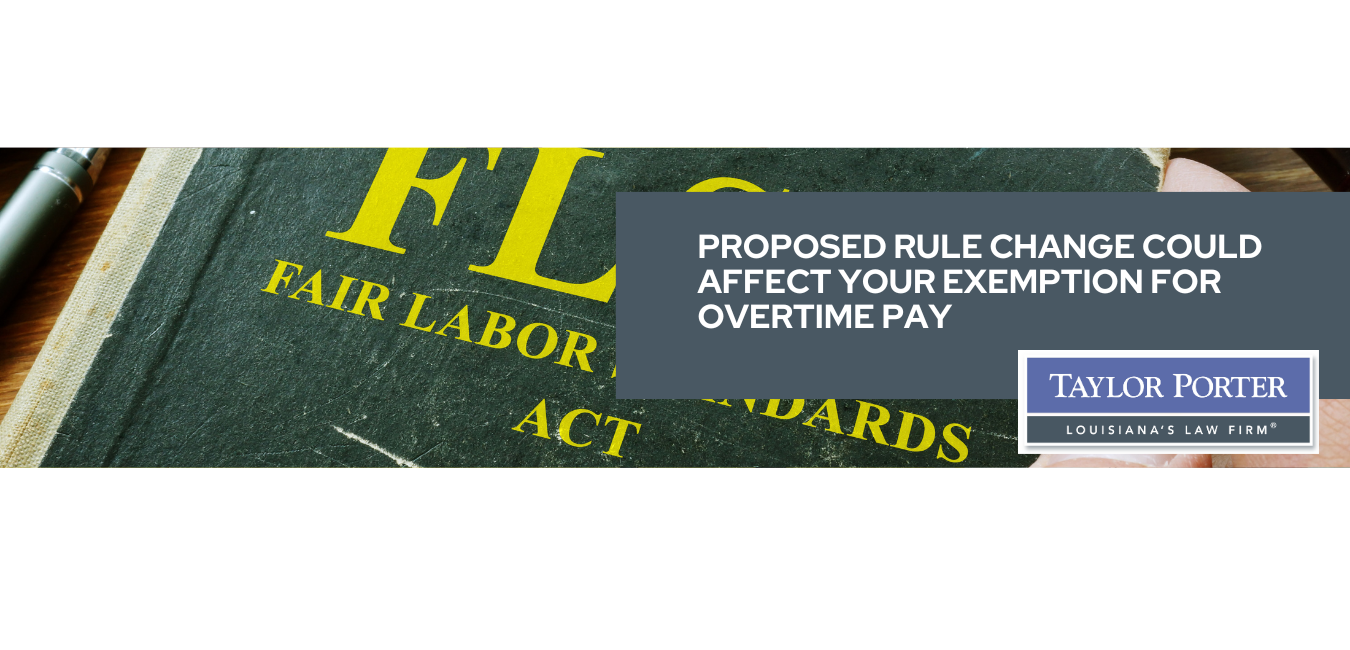TP Employment Attorneys Interviewed on Trump’s Labor Law Changes
From The Baton Rouge Business Report
Taylor Porter labor and employment law attorneys Vicki Crochet, Partner and Practice Team Leader, and Tom Peak, Partner, were interviewed in a Baton Rouge Business Report article, "Specifics Remain to be Seen, But Most Expect Significant Labor Law Changes Under President Trump," published on April 26.
The publication interviewed several attorneys across the Baton Rouge area on topics such as overtime rules, minimum wage, foreign workers, maternity leave, federal judiciary, discrimination concerns, and changes under the EEOC, NLRB and OSHA.
Below is the article:
Scott Huffstetler of Kean Miller has been practicing labor and employment law for 14 years. Like all of his colleagues, he’s closely watching how the new president will change the landscape.
“There is an air of excitement that comes in every time there’s a new administration,” he says. “And there is some anxiety among employers, because so much of employment law is driven by the executive branch.”
Generally speaking, employers can expect less federal oversight under President Donald Trump, who has promised a more business-friendly administration than his predecessor. His budget, which doesn’t carry the force of law but does illustrate the administration’s priorities, proposes deep cuts for enforcement agencies.
However, not every Trump proposal is aimed at making employers’ lives easier. As a candidate, Trump promised to mandate paid maternity leave, and at times suggested he might support a higher federal minimum wage, Huffstetler notes.
And businesses could be drafted into Trump’s promised immigration crackdown. It probably will be harder to get skilled foreign labor into the country, and employers can expect greater scrutiny of their workers’ immigration status. Trump wants to make E-Verify, an online system used to confirm workers’ employment eligibility, mandatory nationwide, “which would be more burdensome for employers,” Huffstetler says.
Vicki Crochet and Thomas Peak, employment and labor attorneys with Taylor Porter, expect to see less emphasis on protecting the LGBT community from discrimination. Peak anticipates the appointments of more business-friendly federal judges, from the U.S. Supreme Court on down. The Senate’s Republican majority held up many of former President Barack Obama’s appointees, leaving Trump with the opportunity to fill more than 100 vacancies on the federal bench.
Appointees to the National Labor Relations Board have staggered terms, so it will take time for Trump to reshape the board, Peak says. But a less union-friendly NLRB might have a chance to end expedited “quickie elections” for workplace unionization, stop permitting “micro-units” to represent certain departments of larger companies, and roll back the recent expansion of the “joint employer standard.”
While the president can’t change the law without Congress, the executive branch has broad discretion over federal contracting. The Obama administration raised the minimum wage for federal contractors to $10.20 per hour and prohibited discrimination based on sexual orientation or gender.
Mark Adams, a labor and employment attorney with Jones Walker, has many clients who are federal contractors, and many of them are frustrated that Trump hasn’t yet made the federal bureaucracy easier to deal with. But it takes time for any new administration to get their hands around the job, Adams says, and that’s especially true with this one.
“Apart from the dysfunction in the current administration, they are way behind in filling key positions in the various agencies,” he says. “The rank-and file folks that are in charge of enforcing the law and administering these various directives kind of don’t know where to go right now, because they’re not getting any direction.”
On March 27, Trump rescinded Obama’s Fair Pay and Safe Workplaces executive order, which would have required prospective federal contractors to disclose labor law violations. But Adams cautions his clients not to expect too much change overnight, nor to assume things will be radically different under a new administration.
“Keep complying with the rules and regulations you’ve been complying with,” Adams tells his clients. “Right now, there’s no rush to engage in any wholesale change.”
Eventually, he thinks regulations that put heavy administrative burdens on employers could be on the chopping block. He doesn’t think LGBT protections fall into that category, although there could be some exemptions for religious organizations.
Adams does not expect the Obama administration’s proposed rule raising the white-collar overtime exemption threshold from $23,600 to $47,746—which would make more workers eligible for overtime and is currently tied up in court—to survive. He says the threshold might still get raised, just not as high as the last administration preferred. Adams says companies he knows of that adjusted their salary structures in anticipation of the Obama overtime rule taking affect seem to be sticking with those changes for now.
The U.S. Equal Employment Opportunity Commission requires employers with 100 or more employees and federal contractors with 50 or more employees to file EEO-1 reports with employment data categorized by race, gender and job category. Adams says human resources directors have been “wringing their hands” about a new requirement to provide salary information in that report.
That new requirement is “dead as a doornail,” Adams believes. It hasn’t been repealed yet, but he predicts it will be.
How will the Trump administration affect labor and employment law?
Generally speaking, employers can expect less federal scrutiny. Beyond that, it’s hard to say for sure, but here are the main topics that experts are watching.
- Overtime rule: The Obama administration’s rule change making more people eligible for overtime, by raising the white-collar exemption threshold from $23,600 to $47,746, is in legal limbo. Trump’s labor secretary nominee dodged questions about the rule at a March 22 hearing, but the administration likely will let it die.
- Minimum wage: Trump has said wages are too high, but at other times expressed openness to a higher minimum wage, which would require an act of Congress.
- Foreign workers: Employers are likely to face greater scrutiny about the immigration status of their employees and new hurdles for foreign worker visas. Trump wants to make the federal E-Verify system mandatory.
- EEOC: The Equal Employment Opportunity Commission may focus less on pay discrimination and LGBT protection and be less aggressive generally. The commission is likely to scrap or alter plans to combat discrimination by requiring employers to provide pay data by gender, race and ethnicity.
- NLRB: Under Obama, the National Labor Relations Board consistently sided with employees and unions. Expect that to change dramatically as Trump’s nominees cycle onto the board.
- OSHA: The Occupational Safety and Health Administration may be less aggressive about enforcement and back away from Obama-era initiatives, such as one meant to protect workers from respirable silica and the electronic recordkeeping rule scheduled to take effect in July.
- Maternity leave: On the campaign trail, Trump promised to guarantee six weeks of paid time off for new mothers.
- Federal judiciary: Trump is likely to appoint conservative, business-friendly judges.
SOURCES: Interviews and publicly available information
This website is for general information purposes only. Information posted is not intended to be legal advice. For more information, please see our Disclaimer message.
See how we can help. Contact us today
8th Floor • 450 Laurel Street • Baton Rouge, LA 70801 • 225-387-3221
- Disclaimer
- © Taylor, Porter, Brooks & Phillips L.L.P. All rights reserved.






